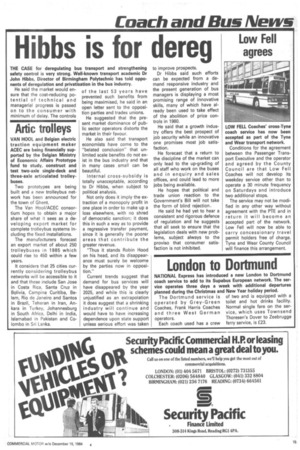Hibbs is for dereg
Page 17

If you've noticed an error in this article please click here to report it so we can fix it.
THE CASE for deregulating bus transport and strengthening safety control is very strong. Well-known transport academic Dr John Hibbs, Director of Birmingham Polytechnic has told opponents of deregulation and privatisation in the bus industry.
He said the market would ensure that the cost-reducing potential of technical and managerial progress is passed on to the consumer with minimum of delay. The controls of the last 53 years have prevented such benefits from being maximised, he said in an open letter sent to the opposition parties and trades unions.
He suggested that the present market dominance of public sector operators distorts the market in their favour.
He also said that transport economists have come to the "belated conclusion" that unlimited scale benefits do not exist in the bus industry and that in many cases small can be beautiful.
Internal cross-subsidy is totally unacceptable, according to Dr Hibbs, when subject to political analysis.
Not only does it imply the extraction of a monopoly profit in one place in order to make up a loss elsewhere, with no shred of democratic sanction; it does this in such a way as to provide a regressive transfer payment, since it is generally the poorer areas that contribute the greater revenue.
"Thus it stands Robin Hood on his head, and its disappearance must surely be welcome by the parties now in opposition."
Current trends suggest that demand for bus services will have disappeared by the year 2025, and while this is clearly unjustified as an extrapolation it does suggest that a shrinking industry will continue and would have to have increasing dependence upon state support unless serious effort was taken to improve prospects.
Dr Hibbs said such efforts can be expected from a demand responsive industry and the present generation of bus managers is displaying a most promising range of innovative skills, many of which have already been used to take effect of the abolition of price controls in 1980.
He said that a growth industry offers the best prospect of job security while an innovative one promises most job satisfaction.
He forecast that a return to the discipline of the market can only lead to the up-grading of all staff who work on the buses and in enquiry and sales offices, and could lead to more jobs being available.
He hopes that political and trade union reaction to the Government's Bill will not take the form of blind rejection.
He said he had yet to hear a consistent and rigorous defence of regulation and he suggests that all seek to ensure that the legislation deals with new problems, subject always to the proviso that consumer satisfaction is not inhibited.












































































